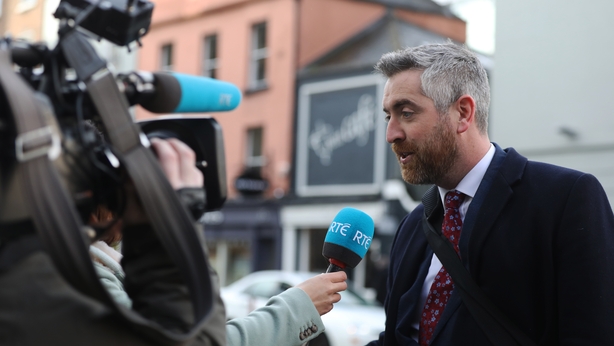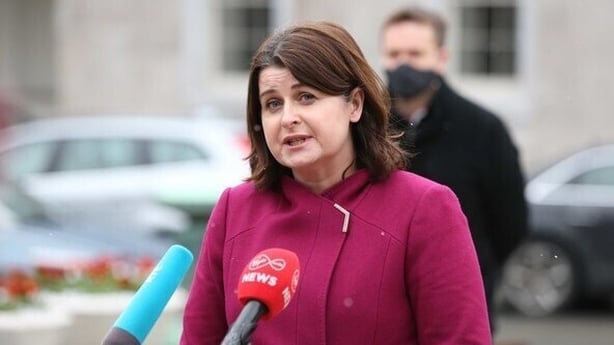Increased profits in the power generation wing of the ESB cannot be used to offset prices by Electric Ireland, as the two sections must operate independently, the Executive Director of Electric Ireland has said.
Pat Fenlon pointed to "unprecedented rises in wholesale gas prices" which "have risen over 1000% over the past 18 months".
He told the Oireachtas Joint Committee on Environment and Climate Action that two years ago, Electric Ireland's annual wholesale energy costs were €300 million, and are now expected to hit €2 billion.
He said that Electric Ireland is "very aware" that prices hikes are "difficult" for customers, and is committed to helping them, but insisted he had "no choice" but to increase prices.
"Disconnections are and always will be a last resort", he said, noting the winter moratorium, and pointing to a hardship fund of €3m.
The recent exits of other energy providers has "significant implications" for Electric Ireland, Mr Fenlon added.
We need your consent to load this rte-player contentWe use rte-player to manage extra content that can set cookies on your device and collect data about your activity. Please review their details and accept them to load the content.Manage Preferences
ESB had an operating profit of €357m in the first six months of 2022, Mr Fenlon said, compared to €363m in the first half of 2021, and insisted this is the best measure of actual financial health.
There were "exceptional gains in first half of 2022" which related to "technical accounting treatments".
"We are engaging daily with customers who are in difficulty and helping them," he said, adding that "we do understand" that people have difficulty reconciling this with the company's large profits.
Fianna Fáil TD Christopher O'Sullivan said consumers will not understand that the hardship fund of €3m is 0.8% of the company's profits for the first six months of this year.

Fine Gael's Alan Farrell said €3m is "a drop in the ocean" and the hardship fund should be increased.
Bríd Smith of Solidarity-PB, dismissed the hardship fund as "a pittance".
Mr Fenlon said "we will actively review how that fund is being used," noting it has only recently been put in place and is similar to the one used during the pandemic.
He defended the fund, but added that it is "just one of a number of things" they do.
125k customers in debt
Mr Fenlon said "in the last month or two" there have been "indications of increasing issues with customers" in difficulty.
150,000 customers were in debt pre-Covid, this fell to 100,000 during Covid, and in the past two months has risen to 125,000.
In debt, he said, means they have not paid their bill on time.

Mr Fenlon said they deal with pay-as-you-go customers "primarily through St Vincent de Paul and MABS".
He told Social Democrats TD Jennifer Whitmore that the company has not written directly to those customers.
Sinn Féin's Réada Cronin also asked if Electric Ireland actively reaches out to vulnerable customers.
ESB Financial Controller Suzanne Ward said they do not, but have details posted on the website.
Asked if the company should write to customers to explain whether they might qualify as vulnerable, Ms Ward said "It's something that we can absolutely look at".
She added that there are payment plans in place for 9,000 customers.
4,000 customers availed of the pandemic hardship fund - which also was €3m - and the company will continue to monitor this new fund, she said.
Mr Fenlon also said they have been "reasonably successful" in moving people onto smart tariffs.
Meanwhile, the Cabinet has approved a plan to pay three electricity credits to every household over the next six months.
It is expected that the €200 credits will be paid in November, January and March.
'Less than 400' disconnections this year
Electric Ireland has "one of the lowest rates of disconnection in the market" and it is "absolutely a last resort", Mr Fenlon said.
The rate has risen "very slightly" but is "still very low", with the company disconnecting "less than 400" this year.
He insisted that Electric Ireland's profits are "very modest".
David Vickers, Pricing and Trading Manager at Electric Ireland, said the increase before last saw an increase in both the standing charge and the unit rate "was a more appropriate management of those costs" than just increasing the unit cost.
He said that homes with more people benefit from this "socialised cost", and not homes with fewer people.
Independent Senator Lynn Ruane asked if people who upgrade their homes are effectively being subsidised by those who cannot afford to do so.
Mr Fenlon it is more expensive to meet higher demand at peak times, hence the push to reduce peak time usage.
Green Party Senator Pauline O'Reilly also criticised increases to standing charges, saying they hit smaller households with lower incomes.
Mr Vickers insisted that the increases are not aimed at increasing profits.
Nicholas Tarrant, MD of ESB Networks, said that it is keeping the security of its infrastructure "under review".
Cormac Devlin, Fianna Fáil TD, had asked what reviews were being undertaken in response to "sabotage or attacks on energy systems" elsewhere in the world.
Mr Tarrant said that the ESB invests "invest very heavily" cybersecurity, and also protects its physical structures.
There is "very tight security around our control centres and our main offices", but "it is not possible to have security around all" of its extensive network, he said.

